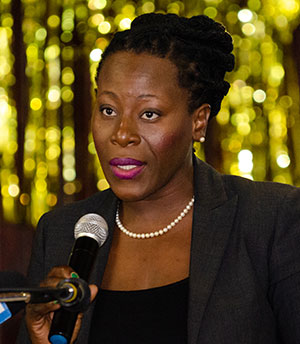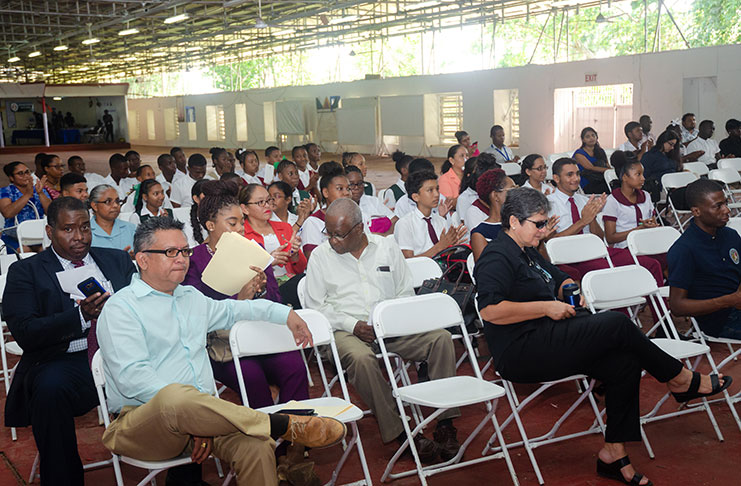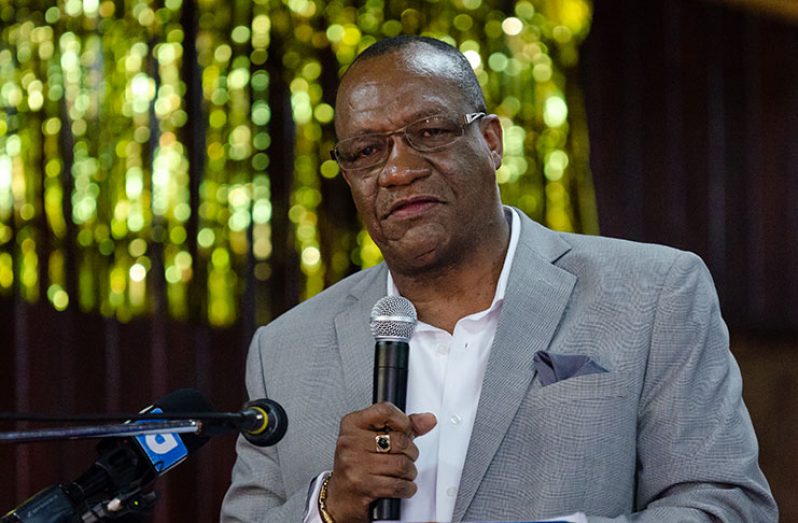–Minister Harmon urges at World Wildlife Day celebrations
MINISTER of State Joseph Harmon called on Guyanese to redouble their efforts to protect the environment, when he delivered the keynote address during an educational forum held in observance of World Wildlife Day under the theme “Life below water: for people and planet.”

He said the theme is aligned with Goal 14 of the United Nations (UN) Sustainable Development Goals (SDG) 2030, which sets the foundation for the advancement of the sustainable use and conservation of the oceans.
In underlying the importance of marine life, the minister of state pointed out that more than three billion people depend on marine and coastal biodiversity for livelihood, with marine fisheries employing over 200M people directly and indirectly.
Despite the importance of the oceans, they continue to be severely affected by pollution. “As much as 40 per cent of the oceans are heavily affected by pollution with an estimated 8M metric tonnes of plastic waste entering the world’s oceans annually,” Minister Harmon detailed.
Here in Guyana, the government is committed to having a systematic ban on single-use plastics, as it plays its role in addressing this global problem. He noted that the Department of the Environment, since the announcement in 2018, has begun its awareness campaign ahead of the 2021 ban. “It is important that we get ourselves ready for that and minimise the use of single-use plastics,” he urged.
It was noted too that the 2019 World Wildlife Day theme is also aligned with objective three of Guyana’s ‘Green’ State Development Strategy (GSDS) Vision 2040. He said organisations such as the Guyana Wildlife Conservation and Management Commission, the Environmental Protection Agency, the Protected Areas Commission, the World Wildlife Fund, Conservation International, the Guyana Marine Turtle Conservation Society and the Iwokrama Centre for Rainforest Conservation, have been working tirelessly towards the conservation and sustainable management of the country’s wildlife.

However, he said the country’s efforts at conservation and sustainable management ought to be improved, and objective three of the GSDS will pave the way for that. That objective addresses the protection, restoration and sustainable use of coastal and marine resources. The provision of coastal ecosystem services and fisheries management, are two strategic areas that would be instituted.
Director of the Department of the Environment, Ndibi Schwiers, said it is an established fact that Guyana is a biologically rich country, home to more than 500 freshwater fish species with about 80 plus species endemic, including the world’s largest freshwater fish – the arapaima. “Although a comprehensive understanding of Guyana’s marine ecosystem is still in its incipient stage, we know that our marine environment has similar characteristics of those of Suriname and French Guiana – being highly productive – contributing just about two per cent of our GDP – with a high diversity and abundance of marine species,” Schwiers said.
However, she said, Guyana, like many other countries, is battling with overfishing, pollution, the inappropriate use of agro-chemicals, and climate change which continue to affect marine life, but the GSDS will help to address many of the issues.
“The government intends to achieve the conservation and preservation of its natural capital through institutionalised and prudent management of its natural resources. We also recognise that Guyana’s marine environment will benefit from improved management of our water resources through the execution of sustainable practices, including the prioritisation of critical natural habitats, inclusive of wetlands that are home to a diverse range of biodiversity,” the director detailed.
Internationally, Guyana’s commitment to the sustainable use of its marine environment is being supported through active participation in the negotiation of an internationally legally binding agreement, under the United Nations Law of the Sea on the conservation and sustainable use of marine biological diversity of areas beyond national jurisdiction.
Commissioner of the Guyana Wildlife Conservation and Management Commission, Alona Sankar, noted that March 3 was declared World Wildlife Day by the United Nations General Assembly during its 68th Session on December 20, 2013. Since then it sets a platform for greater awareness of wildlife and the importance of conservation and management.
She said the commission, which was established on June 1, 2017, is responsible for the management, conservation and protection of Guyana’s wildlife as well as the regulation of internal and external trade of the country’s wildlife. “It is the CITES Management Authority of Guyana and therefore regulates international trade – import, export, re-export and introduction from the sea – of wildlife,” Sankar posited.
Like Minister Harmon, Sankar used the opportunity to call for the protection of the country’s marine resources through simple actions such as using less plastic; utilising more reusable items instead of disposal items; supporting conservation measures; using sustainably harvested products, and disposing of waste in a safe and responsible manner. The educational forum was attended by students from various secondary schools and other key stakeholders involved in the protection of the environment.




.jpg)










